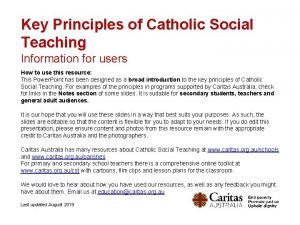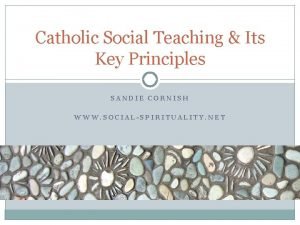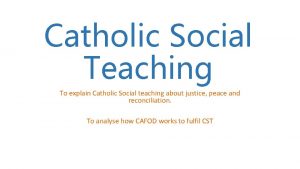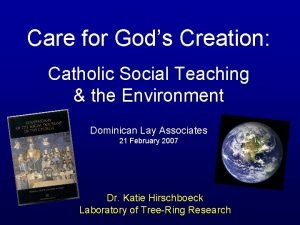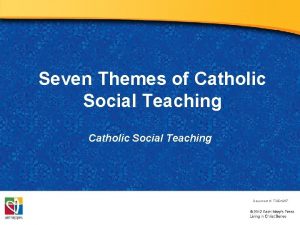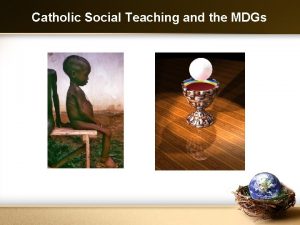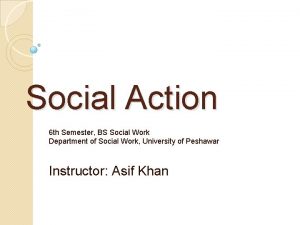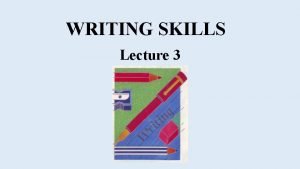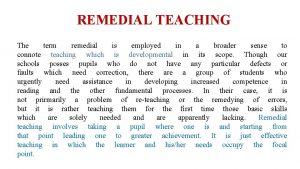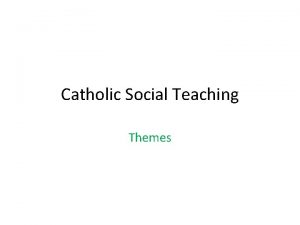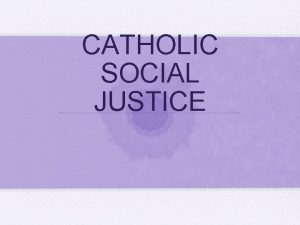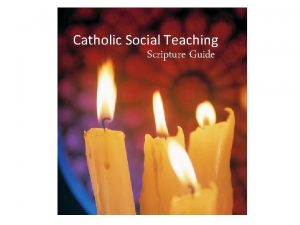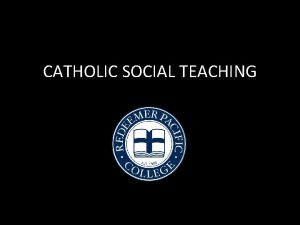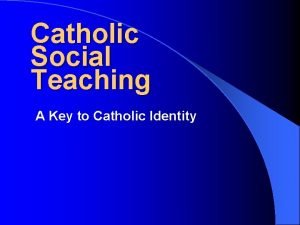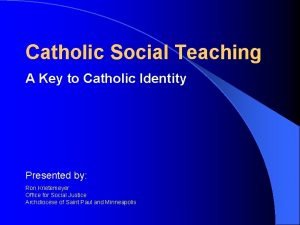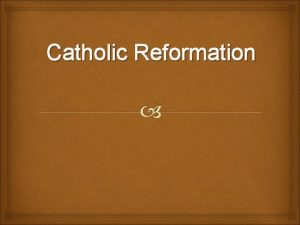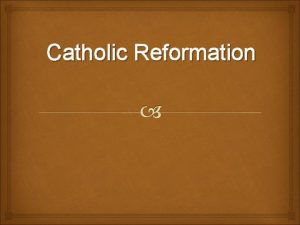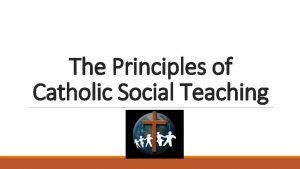The Principles of Catholic Social Teaching Catholic Social















- Slides: 15

The Principles of Catholic Social Teaching

Catholic Social Teaching AKA “Catholic Social Justice Doctrine” • Definition: the body of Church doctrine that applies Jesus’ Gospel to our life together, that is, to society, its institutions, and its economic and political structures. (Pennock) • In English: The Church applying the Gospel message to life in society. • Society: any group of persons bound together for a common end (CSDC 149)

What CST offers… • Principles for reflection • Criteria for making judgments –Judging actions and situations not people. –Love the sinner, hate the sin. • Guidelines for action

1: Life and Dignity of the Human Person • “The foundation of all the principles of our social teaching” (USCCB) • Derived from being God’s special creation (Very Good) not what we do or have. • “Every human being…is invaluable…” (USCCB) and life at all stages should be protected. – NO qualifications, NO exceptions, NO exclusions • So…does this person have dignity?

2. Call to Family, Community, and Participation • “The family is the central social institution that must be supported and strengthened, not undermined. ” (CST, 14) • It is both a right and a duty to participate in society to promote the common good.

3. Rights and Responsibilities • The right to life makes all other rights possible. • Rights are things that you can legitimately claim in order to be guaranteed the minimum conditions for living a truly human life. – Ex. Faith and family life, food and shelter, education and a job, and healthcare. • We are responsible for respecting these rights for all people. (Spiderman) • What are some examples of abusing our rights and not being responsible?

4. Preferential Option for the Poor and Vulnerable • A basic moral test for the health of a society=how are the most vulnerable members faring? • St. Paul’s image of the Church as a body: “If one part suffers, all the parts suffer with it; if one part is honored, all the parts share its joy. ” (1 Cor 12: 12 -26) • Mt 25: The Last Judgment

5. The Dignity of Work and the Rights of Workers • “The economy must serve the people, not the other way around. ” (CST, 15) • “Work is more than a way to make a living; it is a form of continuing participation in God’s creation. ” (USCCB) – We are co-creators with God! • In order to respect this task, workers must have certain rights protected: productive work (opposed to menial), decent and fair wages, right to unionize, private property, and economic initiative.

6. Solidarity • The global dimension of being human. • We are all related and our world has become “smaller” and more interdependent than ever. • Duty to work for peace and justice in the world.

7. Care for God’s Creation • We show respect to God, our Creator, by being good stewards of the earth. • Genesis: “Let them have dominion over…” and “I give you every…”

~The Tuft of Flowers~ by Robert Frost I went to turn the grass once after one Who mowed it in the dew before the sun. A leaping tongue of bloom the scythe had spared Beside a reedy brook the scythe had bared. The dew was gone that made his blade so keen Before I came to view the leveled scene. I left my place to know them by their name, Finding them butterfly weed when I came. I looked for him behind an isle of trees; I listened for his whetstone on the breeze. The mower in the dew had loved them thus, By leaving them to flourish, not for us, But he had gone his way, the grass all mown, And I must be, as he had been, --alone, Nor yet to draw one thought of ours to him. But from sheer morning gladness at the brim. `As all must be, ' I said within my heart, `Whether they work together or apart. ' The butterfly and I had lit upon, Nevertheless, a message from the dawn, But as I said it, swift there passed me by On noiseless wing a 'wildered butterfly, That made me hear the wakening birds around, And hear his long scythe whispering to the ground, Seeking with memories grown dim o'er night Some resting flower of yesterday's delight. And feel a spirit kindred to my own; So that henceforth I worked no more alone; And once I marked his flight go round and round, As where some flower lay withering on the ground. But glad with him, I worked as with his aid, And weary, sought at noon with him the shade; And then he flew as far as eye could see, And then on tremulous wing came back to me. And dreaming, as it were, held brotherly speech With one whose thought I had not hoped to reach. I thought of questions that have no reply, And would have turned to toss the grass to dry; `Men work together, ' I told him from the heart, `Whether they work together or apart. ' But he turned first, and led my eye to look At a tall tuft of flowers beside a brook,

Prayer “May the Lord Jesus and his Holy Spirit burn within my heart. May I have the eyes to notice those in need. May I develop a keen mind to help understand how to respond to them. And may I have a courageous and compassionate heart to act on their behalf. Amen. ”

Reflection Questions 1. Who is someone that you have a great respect for? What characteristics do they have that cause you to respect them? 2. Who is someone that you struggle to have respect for? Why? – What does CST have to say about this person? (Even at a minimum…) 3. What is one concrete way that you can/will work to increase the respect you have towards people whom you find it hard to respect?

Defense of Dignity 1. If you believe a newborn child has dignity and deserves to be treated with dignity, what defense would you give to someone who thought that newborns do not have dignity? 2. What defense would you give to someone who thought Obama, Kapaun students, etc. (choose 1 other than newborns) does not have dignity? 3. Which is harder to defend? Explain. 4. Why do you think people don’t defend the dignity of others even if they acknowledge

 Catholic social teachings caritas
Catholic social teachings caritas Sandie cornish
Sandie cornish Cafod catholic social teaching
Cafod catholic social teaching It is a key to catholic identity
It is a key to catholic identity Catholic social teachings care for god's creation
Catholic social teachings care for god's creation Cst themes
Cst themes Seven key themes of catholic social teaching
Seven key themes of catholic social teaching Catholic teaching on poverty
Catholic teaching on poverty Micro teaching is a scaled down teaching
Micro teaching is a scaled down teaching Scope of social action
Scope of social action Principles for teaching writing
Principles for teaching writing Principles of desuggestopedia method
Principles of desuggestopedia method 7 principles of teaching
7 principles of teaching 10 objectives of remedial instruction
10 objectives of remedial instruction End goals of mtb-mle
End goals of mtb-mle The principles of interactive language teaching
The principles of interactive language teaching
